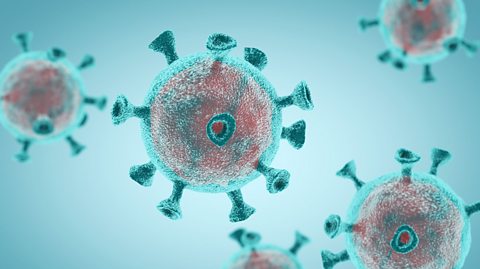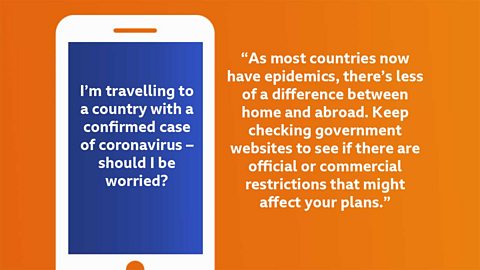This article was last updated in March 2020.
Coronavirus is all over the news at the moment, but it can be difficult to understand.
There are updates about the virus everyday and it can sometimes be hard to keep up because the situation changes so quickly.
Dr Mike Skinner, who teaches Virology (the study of viruses) at Imperial College London, has answered questions you've sent in to us via . But first, let's take a look at what's happened up until now.

What's happened so far?
What you may know as coronavirus started in Wuhan, a city in the Hubei province of China.
It spread quickly across the country, and from there to many other places places in the world, with Italy being the worst-affected country outside China.
On 30 January, the coronavirus outbreak was declared a global emergency by the World Health Organisation (WHO).
WeÔÇÖve now got a number of small clusters in the UK, most of which have been traced to people who have come back from the most highly affected areas. A very small number of people here have also died from the disease.
On 11 March, the WHO declared the coronavirus outbreak a pandemic. To find out what that and other key terms about the story mean, have a look at our glossary.

How did the virus start?
- We believe the virus originated in bats in China. ItÔÇÖs likely that a couple of bat viruses exchanged some genetic material a few decades ago and that the virus has been evolving since then, in bats or possibly another species. At some point more recently, that evolution meant it could now infect humans and more crucially - transmit between them. At this point, we suspect an infected animal(s) was taken to a market, where the virus infected a stall owner or customer.
How does it affect the human bodyÔÇÖs cells?
- All viruses have to replicate inside cells. Some do that best in particular cells but they have to get into the body via cells at the surface (in this case, the respiratory tract). We donÔÇÖt know much yet about this virus but some viruses kill the cells, others just disrupt their normal function, causing disease symptoms.
What are the symptoms?
- A dry cough, fever, shortness of breath. In 80% of those infected, these will be mild; more severe (like flu) in the rest. An extremely small proportion of people may become critically ill and may die, and this can be affected by age or underlying health conditions.
How long do symptoms last?
- For most people, the most acute [most serious] phase will be about a week but the cough may last longer.
Is it worse than the flu?
- At a population level, yes because the mortality rate is higher - but for most individuals it will be similar.
Is it true that only older people need to worry about the virus?
- ItÔÇÖs true that the older you are, the more likely it is youÔÇÖll feel worse symptoms of the virus. However, because none of us have immunity at this stage, it means we should all be vigilant and do our best to not spread the infection.
Do masks actually help or are they pointless?
- Medics wear them to protect their patients and to stop large ÔÇ£splashesÔÇØ. We believe they may help reduce spread from an infected person but they donÔÇÖt help much to stop us getting infected when weÔÇÖre out and about.
What should I do if IÔÇÖve got asthma?Look after your asthma, and follow government advice on avoiding infection. It might also be a good idea to call your GP to discuss your medication.
1 of 8
IÔÇÖm travelling to a country with a confirmed case of coronavirus ÔÇô should I be worried?
- As most countries now have epidemics, thereÔÇÖs less of a difference between home and abroad. Keep checking government websites to see if there are official or commercial restrictions that might affect your plans. The current advice is to not travel at all.
Should I prepare food in case there are any shortages?
- WeÔÇÖre talking about people being quarantined or self-isolating for seven to 14 days. Nobody wants an empty food cupboard but at this stage, quarantine is just a possibility and we donÔÇÖt need trolleys full of food and toilet roll to live off for a week or two!
Does the virus really die in hot conditions?
- Viruses are killed by heat but only at temperatures greater than 50C. ItÔÇÖs probably more that transmission is less efficient, as the droplet containing the virus dries out. However, we donÔÇÖt know how much that will affect transmission of this virus in the present epidemics.
When do you think the virus will disappear?
- Unlike Sars, we doubt it will disappear but believe it will become part of the normal virus environment. However, the majority of us will be immune so it wonÔÇÖt cause epidemics. Eradicating it will probably need a vaccine.
How can I prevent it infecting me?
- Following government guidance on good hygiene first and foremost. This includes, but is not limited to hand washing, avoiding touching face (especially eyes, nose, mouth) and avoiding hand contact. This will reduce - and especially delay - infection.
Why are the media publicising it so much?
- Because itÔÇÖs new and unknown, and because itÔÇÖs a truly global issue. Also, people donÔÇÖt know how it will affect travel, trade, education.
Should we believe all the stuff on the media?
- Never believe everything! Always test what you see and hear by checking other sources. DonÔÇÖt just follow opinion - look for factual material.
1 of 6

The official NHS advice on how to protect yourself from coronavirus is:
- Wash your hands with soap and water often and for at least 20 seconds - roughly as long as it takes to sing Happy Birthday twice
- Always wash your hands when youÔÇÖve been in a public place
- Use hand sanitiser gel if soap and water are not available
- DonÔÇÖt cough or sneeze into your hands, do so into a tissue, your sleeve or the crook of your elbow
- Catch it, bin it, kill it: put used tissues in the bin straight away and wash your hands afterwards
- Try to avoid close contact with people who are unwell
- Do not touch your eyes, nose or mouth if your hands are not clean
Coronavirus: Jargon buster and other things you need to know
We've broken down the key terms you need to know about coronavirus.

Vaccinations explained
Learn about vaccines, herd immunity and more.


